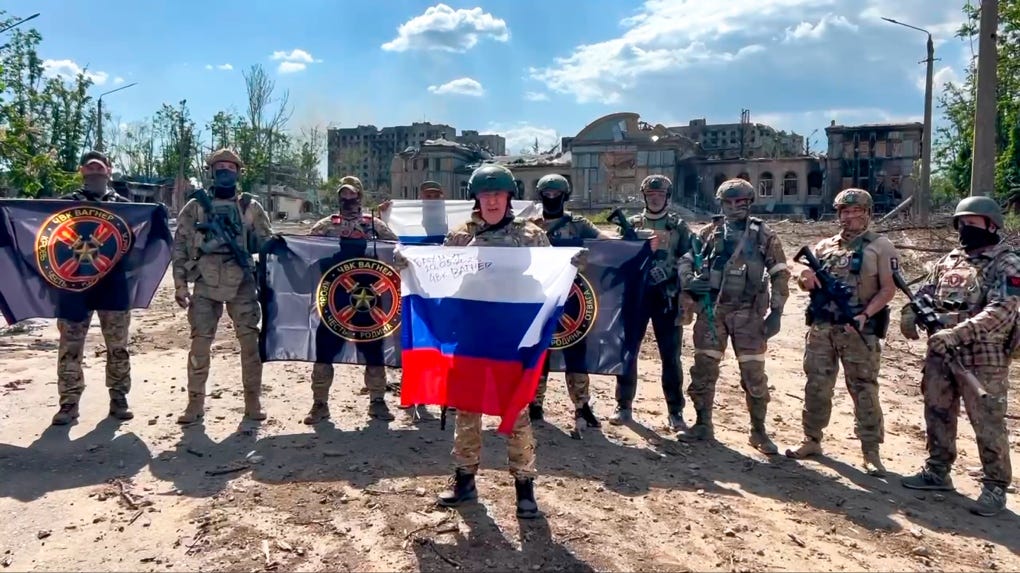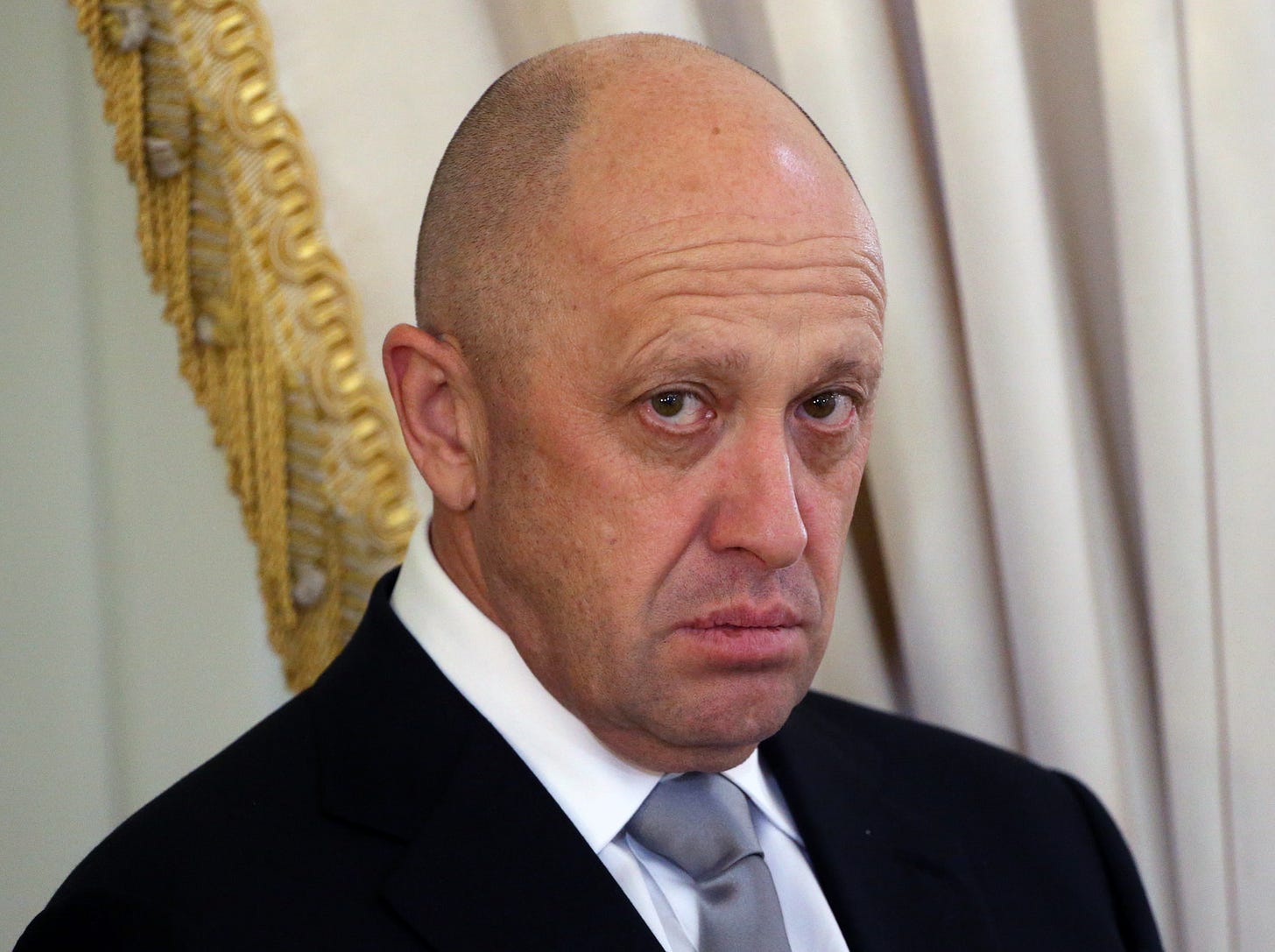Ride of the Valkiriki
Prigozhin, Wagner, Franco and the Falangists, Tudjman and HOS, and the coup d'état that wasn't
Over the course of this past weekend, I received several dozen emails and private messages requesting my take on Wagner’s supposed coup d'état attempt in Russia.
Thankfully, I was out of the country and not in front of my laptop, meaning that I could only monitor the situation through my smartphone, giving me only a surface-level understanding the events as they happened. Thankfully. Thankfully, because this conflict has thrown up so many surprises since it was launched in February of last year that I have learned not to immediately opine on any new development until at least some of the dust has settled. This prudent approach, the result of luck by personal scheduling, has proven itself to be the right one again.
Big name historians, writers, and commentators could not help but embarrass themselves over the weekend, proclaiming the “End of Putin”, or the beginning of a new “Russian civil war”. These types should know better in light of the fact that EVERYONE has gotten this conflict wrong, but fame and ego are hungry beasts that must be continually sated. Snyder, Applebaum, Rubin, et. al. are also safe in the knowledge that there is no accountability in media these days, meaning that they can stick their necks out and get everything wrong over and over again, without ever fearing that their pedestal will be yanked out from under them.
Having dodged this very slow bullet, I can now put this past weekend’s event into context, and supply readers with historical examples of similar cases that are worth understanding. But first, let’s take a quick glance at Wagner, and what has led up to their mutiny.
Prigozhin, Wagner, and “The Orchestra”
PMC Wagner has a murky origin, with many claiming that it was founded by former GRU (Russian Military Intelligence) Special Forces Lieutenant Colonel Dmitry Utkin, and that his call sign was “Wagner”, which was then used to christen the nascent private military contractor. The sheer volume of English-language information on Wagner and Utkin makes sorting out what is fact and what is fiction very difficult. Disinformation and malinformation abound, especially because this is wartime, and even more so due to the fact that they are on the ‘wrong side of history’.
What we do know is that Wagner has been used in both Africa (Central African Republic, Mali, Libya, Sudan etc.) and in the Middle East (Syria) as a mercenary group that often works hand-in-glove with Russian foreign policy objectives. What we also know is that Wagner abroad has been staffed by seasoned mercenaries, and that they have earned quite a lot of grudging respect over the past decade, alongside the expected charges of “war crimes” by organizations opposed to their efforts and who are also hostile to Russia. Wagner has assisted in propping up regimes under attack, securing gas and oil fields, protecting shipping from pirates, etc., all the while earning a tidy profit. PMCs are a growing industry not just out of a perceived market need, but also because they can provide plausible deniability for states seeking an extra layer of protection via outsourcing military actions to them (think: Blackwater aka Academi).
The face of Wagner is Yevgeny Prigozhin aka “Putin’s Chef”. An ex-con who spent over a decade in Soviet and Russian prisons, he became a restauranteur and caterer in St. Petersburg upon his re-introduction into society. Prigozhin quickly began to obtain government contracts, facilitating his initial contacts with Vladimir Putin, then Deputy Mayor of Russia’s second largest city. Amassing significant wealth over the next two decades, he began to finance Wagner’s activities, earning him a seat among Russia’s powerbrokers.
Wagner was active during the first round of fighting in the Donbass back in 2014, so their presence in this second round was expected by all. Initially, only 300 Wagner men were taking part in the fighting in the Donbass in the spring of 2022, but thanks to their reputation, their numbers began to swell upwards. In July of that same year, Wagner began to accept prison inmates from Russia to boost their numbers yet again, in a controversial scheme that would see the criminals’ sentences commuted if they signed up and fought for the outfit. These former inmates would go on to become cannon fodder in the Battle of Bakhmut, where Wagner has earned its greatest glory in the war so far, pushing the UAF out of this city that Zelensky demanded must be “defended at all costs”.
Wagner was nicknamed “The Orchestra”, alluding to its official name, with fighters known as “musicians”. The Orchestra came in handy for Russian military planners as it provided a source of seasoned veterans with vast frontline experience, plugging in the holes left open by the Russian General Staff’s decision to go into Ukraine with a light touch. Wagner’s key role in the block-by-block and house-by-house clearing of Bakhmut allowed the Russian Ministry of Defense the time to build fortifications across southern and eastern Ukraine (in anticipation of a future and now present UAF counteroffensive), and to train new conscripts before sending them into the fight. For months on end, it seemed that the only Russians fighting the Ukrainians were Wagner, and locals from Luhansk and Donetsk Oblasts. The absence of regular Russian forces (outside of artillery units supporting Wagner and the various local outfits) in the day-to-day fighting was by design.
This design appeared to be working, but it contained a fatal flaw: a lack of understanding of the character of Wagner’s public face, Yevgeny Prigozhin.





